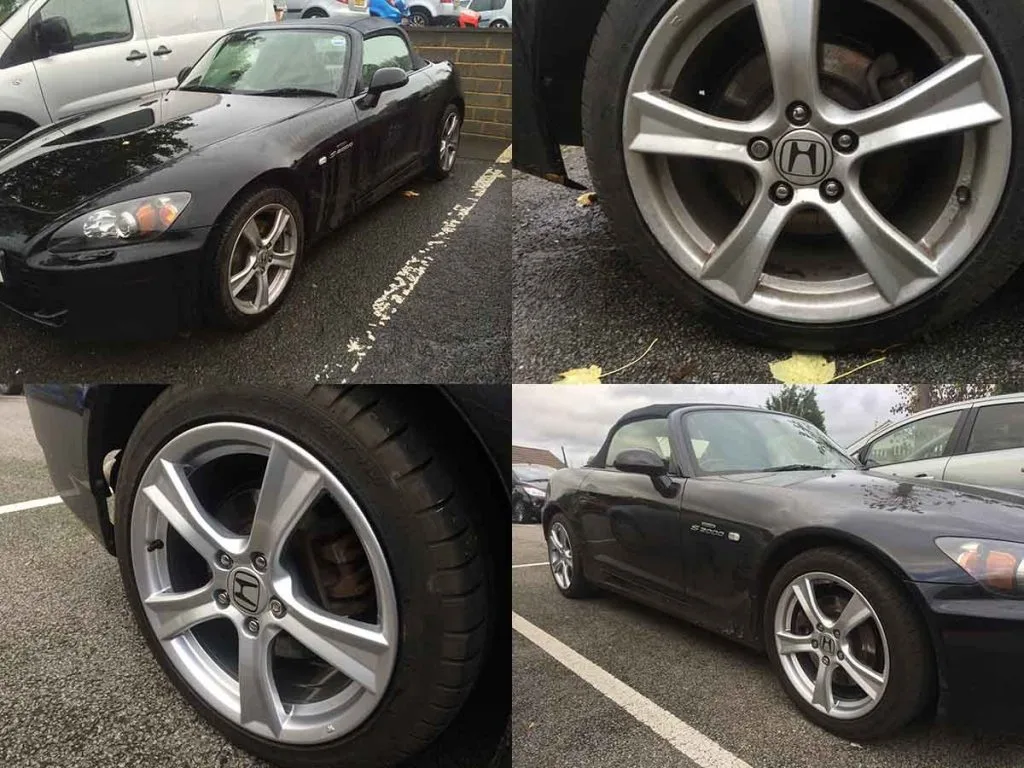Car alloy wheels, typically made from a combination of aluminum and other metals, are lighter and more stylish than traditional steel wheels. However, their lightweight construction and polished finish make them susceptible to scratches, dents, and corrosion. In Leeds, where road conditions and driving habits can exacerbate wear and tear, alloy wheel repairs are a common service. By understanding the causes of damage, you can take proactive steps to minimise the need for repairs and extend the lifespan of your car alloy wheels.
Table of Contents
ToggleThe Cost of Neglecting Car Alloy Wheel Damage
Ignoring minor damage to car alloy wheels can lead to more significant problems, such as compromised structural integrity or reduced vehicle safety. Repair costs for alloy wheels can vary depending on the extent of the damage, ranging from £90 to £180 per wheel for minor fixes, with more extensive repairs costing upwards of £250. Regular maintenance and prompt attention to damage can save you from these expenses and preserve your car’s resale value.

1. Potholes: The Silent Killers of Car Alloy Wheels
How Potholes Damage Car Alloy Wheels
Potholes are one of the leading causes of car alloy wheel damage, particularly in areas like Leeds, where uneven road surfaces are common. Driving over a pothole at high speed can cause immediate damage, such as dents, cracks, or bends in the alloy wheel. The impact can also misalign the wheel, leading to uneven tire wear and compromised handling.
Real-World Impact in Leeds
Leeds’ roads, like many urban areas, are riddled with potholes due to heavy traffic and weather-related wear. A 2023 survey by the RAC found that pothole-related vehicle damage claims have risen by 40% in the UK over the past five years. For car alloy wheels, the consequences are even more pronounced due to their softer material compared to steel.
How to Prevent Pothole Damage to Car Alloy Wheels
- Drive Cautiously: Reduce your speed when approaching areas with known potholes or poorly maintained roads. Slowing down gives you more time to react and minimises the impact if you hit a pothole.
- Stay Alert: Familiarise yourself with the roads in Leeds and avoid routes with frequent potholes when possible. Apps like Waze or Google Maps can provide real-time updates on road conditions.
- Regular Inspections: After driving over a pothole, inspect your alloy wheels for signs of damage, such as dents, cracks, or scuffs. Early detection can prevent further deterioration.
- Use Quality Tires: High-quality tires with proper tread depth can absorb some of the impact from potholes, reducing the stress on your car alloy wheels.
What to Do If Damage Occurs
If you suspect pothole damage to your car alloy wheels, contact a professional alloy wheel repair service in Leeds immediately. Many providers, such as Car Cosmetics, offer same-day repairs to restore your alloy wheels to their original condition. Delaying repairs can lead to more extensive damage, such as tire leaks or wheel misalignment.
2. Scratches and Scuffs from Curbs and Edges
How Scratches Occur on Car Alloy Wheels
Car alloy wheels are particularly vulnerable to scratches and scuffs when they come into contact with curbs, pavements, or other vehicles. These incidents often happen during parking or when navigating tight spaces. Even minor contact can leave unsightly marks on the alloy wheel’s surface, detracting from your car’s appearance.
The Aesthetic and Functional Impact
Scratched or scuffed car alloy wheels not only ruin your vehicle’s look but can also expose the metal to corrosion, especially if the protective coating is compromised. Over time, untreated scratches can weaken the car alloy wheel’s structure, leading to more severe issues.
Prevention Tips for Scratches on Car Alloy Wheels
- Practice Careful Parking: Take extra care when parallel parking or maneuvering near curbs. Use parking sensors or cameras if your vehicle is equipped with them.
- Maintain Safe Distances: Keep a safe distance from other vehicles, especially in tight traffic conditions, to avoid accidental contact.
- Install Wheel Protectors: Consider adding rim protectors or hubcaps to shield your car alloy wheels from minor impacts.
- Regular Cleaning: Wash your alloy wheels regularly to remove debris that could cause micro-abrasions over time.
Repairing Scratched Car Alloy Wheels
For minor scratches, professional alloy wheel repair services can sand, polish, and refinish the wheel to restore its appearance. In Leeds, companies like Car Cosmetic specialise in cosmetic car alloy wheel repairs, ensuring a seamless finish. For deeper scratches, the alloy wheel may need to be refinished or, in severe cases, replaced.

3. DIY Wheel Nut Mishandling
The Risks of DIY Repairs on Car Alloy Wheels
Attempting to remove or tighten wheel nuts without the proper tools or expertise can lead to significant damage to car alloy wheels. Using incorrect tools or excessive force can strip the nuts, damage the alloy wheel’s mounting surface, or cause cracks.
Common Mistakes
- Using the Wrong Tools: Standard wrenches or low-quality tools may not fit properly, leading to slippage and damage to the alloy wheel.
- Over-Tightening: Excessive force can distort the car alloy wheel or damage the threads, making future removals difficult.
- Lack of a Locking Wheel Nut Key: Many modern vehicles use locking wheel nuts for security, and attempting to remove them without the key can damage the alloy wheel.
Prevention Tips for DIY Damage
- Leave It to Professionals: Unless you have the correct tools and experience, avoid DIY car alloy wheel nut repairs. Professional services in Leeds can handle wheel nut issues safely and efficiently.
- Invest in Quality Tools: If you must perform maintenance yourself, use a torque wrench to ensure proper tightening and avoid damage to your alloy wheels.
- Check for Locking Nut Keys: Always keep your locking wheel nut key in a safe place and use it when necessary.
Professional Solutions for Car Alloy Wheel Repairs
If you’ve damaged your car alloy wheels while attempting to handle wheel nuts, contact a reputable repair service. Experts can assess the damage, repair the alloy wheel, and ensure the nuts are properly secured to prevent future issues.
4. Overzealous Car Washing Practices
How Car Washes Damage Car Alloy Wheels
While keeping your car clean is essential, improper washing techniques can harm car alloy wheels. Automatic car washes that use harsh chemicals or high-pressure sprays can strip the protective coating on alloy wheels, leading to corrosion and discoloration.
The Impact of Acid-Based Cleaners
Acid-based cleaning agents, commonly used in some automatic car washes, can erode the car alloy wheel’s clear coat, exposing the metal to environmental elements. This can result in pitting, fading, or a dull appearance over time.
Prevention Tips for Car Wash Damage
- Opt for Hand Washing: Whenever possible, wash your alloy wheels by hand using pH-neutral cleaners designed for automotive use.
- Limit Automatic Washes: Avoid frequent visits to automatic car washes, especially those using acidic sprays or abrasive brushes.
- Use Protective Coatings: Apply a wax or sealant to your car alloy wheels to create an additional layer of protection against harsh chemicals.
Repairing Car Wash Damage to Car Alloy Wheels
If your car alloy wheels have been damaged by improper washing, professional refinishing can restore their shine. Services in Leeds often include cleaning, sanding, and applying a new protective coating to prevent further damage to alloy wheels.

5. Harsh Cleaning Tools and Agents
The Dangers of Improper Cleaning Equipment
Using the wrong cleaning tools or agents can cause scratches, swirls, or chemical damage to car alloy wheels. Hard-bristled brushes, abrasive sponges, or aggressive cleaning chemicals can ruin the alloy wheel’s finish and lead to costly repairs.
Common Cleaning Mistakes
- Hard Brushes: Brushes with stiff bristles can create micro-scratches on the car alloy wheel’s surface.
- Abrasive Cleaners: Household cleaners or non-automotive products may contain chemicals that damage the alloy wheel’s protective coating.
- Neglecting Rinsing: Failing to rinse off cleaning agents thoroughly can leave residues that cause corrosion on car alloy wheels.
How to Clean Car Alloy Wheels Safely
- Use Soft Tools: Opt for soft-bristled brushes or microfiber cloths to clean your car alloy wheels without scratching the surface.
- Choose the Right Cleaners: Use pH-neutral, wheel-specific cleaning products to avoid chemical damage to alloy wheels.
- Rinse Thoroughly: After cleaning, rinse the alloy wheels thoroughly to remove all traces of cleaning agents.
- Dry Properly: Use a microfiber towel to dry the car alloy wheels and prevent water spots or corrosion.
Professional Cleaning and Repair for Car Alloy Wheels
If your car alloy wheels have been damaged by improper cleaning, professional repair services can restore their appearance. In Leeds, experts can polish out minor scratches and apply protective coatings to prevent future damage to alloy wheels.
6. Driving with Under-Inflated Tires
How Under-Inflated Tires Damage Car Alloy Wheels
Under-inflated tires put additional stress on alloy wheels, as they fail to absorb shocks from the road effectively. This can lead to bends, cracks, or dents in the car alloy wheel, especially when driving over uneven surfaces or potholes.
The Importance of Tire Pressure
Maintaining proper tire pressure is critical for both tire and alloy wheel health. Under-inflated tires can cause uneven weight distribution, increasing the likelihood of car alloy wheel damage and reducing fuel efficiency.
Prevention Tips for Tire-Related Damage
- Check Tire Pressure Regularly: Inspect your tire pressure at least twice a month using a reliable tire pressure gauge.
- Follow Manufacturer Guidelines: Ensure your tires are inflated to the recommended pressure levels specified in your vehicle’s manual.
- Monitor for Leaks: If you notice consistent pressure loss, have your tires and alloy wheels inspected for leaks or damage.
- Rotate Tires: Regular tire rotation promotes even wear and reduces stress on your car alloy wheels.
Addressing Tire-Related Car Alloy Wheel Damage
If under-inflated tires have caused damage to your alloy wheels, seek professional repair services immediately. In Leeds, same-day repair options are available to restore damaged car alloy wheels and ensure your vehicle is safe to drive.
Why Timely Car Alloy Wheel Repairs Are Essential
Addressing alloy wheel damage promptly can prevent minor issues from escalating into major problems. Damaged car alloy wheels can compromise vehicle safety, reduce fuel efficiency, and affect handling. Additionally, neglecting repairs can lead to more extensive damage, requiring costly replacements rather than simple fixes.
Benefits of Professional Car Alloy Wheel Repair in Leeds
- Quick Turnaround: Many repair services in Leeds, such as Car Cosmetics, offer same-day repairs, minimising downtime for your alloy wheels.
- Cost-Effective: Repairing car alloy wheels is often more affordable than replacing them, saving you money in the long run.
- Enhanced Appearance: Professional repairs restore the aesthetic appeal of your alloy wheels, maintaining your car’s resale value.
- Improved Safety: Properly repaired car alloy wheels ensure optimal vehicle performance and safety on the road.

How to Choose a Reliable Car Alloy Wheel Repair Service in Leeds
When selecting a repair service for your alloy wheels, consider the following factors:
- Experience and Expertise: Choose a provider with a proven track record in car alloy wheel repairs, such as Car Cosmetics.
- Customer Reviews: Check online reviews and testimonials to gauge the quality of service for alloy wheel repairs.
- Warranty: Opt for a service that offers a warranty on car alloy wheel repairs to ensure long-lasting results.
- Same-Day Service: Look for providers that offer quick turnaround times to get your alloy wheels back on the road faster.
Preventive Maintenance Tips for Car Alloy Wheels
To keep your car alloy wheels in pristine condition, incorporate these maintenance practices into your routine:
- Regular Inspections: Check your car alloy wheels for signs of damage, such as dents, scratches, or corrosion, at least once a month.
- Clean Properly: Use safe cleaning methods and products to maintain the alloy wheel’s finish.
- Drive Mindfully: Avoid potholes, curbs, and rough roads whenever possible to protect your car alloy wheels.
- Protective Coatings: Apply wax or sealants to protect your alloy wheels from environmental damage.
- Professional Checkups: Schedule periodic inspections with a professional to catch potential issues with your car alloy wheels early.
The Role of Car Alloy Wheels in Vehicle Performance
Car alloy wheels do more than enhance your car’s appearance—they also contribute to its performance. Their lightweight construction improves fuel efficiency, handling, and braking compared to heavier steel wheels. However, damaged car alloy wheels can negate these benefits, making regular maintenance and timely repairs essential.
Conclusion: Protect Your Car Alloy Wheels Today
Car alloy wheels are a valuable investment, but they require proper care to maintain their appearance and functionality. By understanding the common causes of damage—potholes, scratches, improper DIY repairs, harsh car washes, incorrect cleaning methods, and under-inflated tires—you can take proactive steps to protect your car alloy wheels. Regular maintenance, cautious driving, and timely repairs can save you from costly fixes and keep your vehicle looking and performing its best.
If you’re in Leeds and need car alloy wheel repairs, contact a trusted provider like Car Cosmetics for fast, reliable service. Don’t let damaged alloy wheels detract from your driving experience—act now to keep your car alloy wheels in top condition!
For more information on alloy wheel care or to schedule a repair, visit our website or contact our team today. Stay tuned to our blog for additional tips on maintaining your vehicle’s car alloy wheels and overall performance.
Frequently Asked Questions (FAQ)
What are the most common causes of car alloy wheel damage?
Car alloy wheels can be damaged by potholes, scratches from curbs, improper DIY wheel nut handling, harsh car washing practices, aggressive cleaning tools or agents, and driving with under-inflated tires. These factors can lead to dents, cracks, scratches, or corrosion, affecting both the appearance and functionality of your alloy wheels.
How can I prevent damage to my car alloy wheels?
To protect your car alloy wheels, drive cautiously to avoid potholes and curbs, use proper tools for wheel maintenance, clean wheels with pH-neutral products and soft tools, maintain correct tire pressure, and apply protective coatings like wax or sealants. Regular inspections and professional checkups also help catch issues early.
How much does it cost to repair a damaged car alloy wheel in Leeds?
The cost of repairing a car alloy wheel in Leeds typically ranges from £90 to £180 for minor damage, such as scratches or scuffs. More extensive repairs, like fixing cracks or bends, can cost upwards of £250. Costs vary depending on the damage severity and the repair service provider.
Can I repair my car alloy wheels myself, or should I hire a professional?
While minor cleaning and maintenance can be done at home with the right tools and products, repairing car alloy wheel damage, such as dents, cracks, or scratches, is best left to professionals. DIY attempts without proper tools or expertise can worsen the damage. Trusted services like Car Cosmetics in Leeds offer same-day repairs for optimal results.
Bonus Section: Advanced Tips for Alloy Wheel Longevity
To go beyond basic maintenance and ensure your alloy wheels remain in pristine condition for years, consider these advanced strategies:
1. Seasonal Wheel Protection
Leeds experiences varied weather, from rainy winters to sunny summers, which can affect alloy wheels. In winter, road salt and grit can accelerate corrosion. To combat this:
- Apply Ceramic Coatings: A ceramic coating provides a durable, long-lasting barrier against salt, water, and UV rays. Professional application can last up to two years.
- Winter Wheel Swap: Consider using a separate set of steel wheels during winter months to protect your alloy wheels from harsh conditions.
2. Wheel Alignment and Balancing
Misaligned or unbalanced wheels can put uneven stress on alloy wheels, leading to premature wear. Schedule wheel alignment and balancing:
- Every 6 Months: Regular checks ensure your wheels are properly aligned, reducing strain and preventing damage.
- After Major Impacts: If you hit a pothole or curb, have your alignment checked to avoid long-term issues.
3. Custom Wheel Covers
For added protection, invest in custom-fit wheel covers designed for alloy wheels. These covers:
- Shield Against Debris: They protect wheels from road debris, brake dust, and minor impacts.
- Enhance Aesthetics: Many covers come in stylish designs, allowing you to maintain your car’s look while adding protection.
4. Regular Professional Detailing
While hand washing is effective, periodic professional detailing can deep-clean alloy wheels and apply advanced protective treatments. Detailers use specialized tools and products to:
- Remove Stubborn Contaminants: Brake dust and tar can be difficult to clean at home, but professionals can restore your wheels’ shine.
- Apply Sealants: High-quality sealants offer longer-lasting protection than standard waxes.
5. Monitor Driving Habits
Your driving style significantly impacts alloy wheel longevity. To minimize wear:
- Avoid Aggressive Driving: Sudden acceleration, braking, or sharp turns can stress wheels, especially when combined with poor road conditions.
- Plan Routes: Use apps to find smoother roads in Leeds, reducing the risk of damage from rough surfaces.
6. Upgrade to High-Quality Alloy Wheels
If you’re replacing damaged wheels, consider upgrading to higher-quality alloys with enhanced durability. Look for:
- Forged Alloy Wheels: These are stronger and lighter than cast alloys, offering better resistance to impacts.
- Corrosion-Resistant Finishes: Wheels with advanced coatings, such as powder coating, are less prone to corrosion.
By incorporating these advanced tips, you can significantly extend the life of your alloy wheels, reduce repair costs, and maintain your vehicle’s performance and appearance.
Legal Stuff
Car Cosmetics (www.carcos.co.uk) proudly complies with all relevant UK regulations, ensuring our car cosmetic services in Leeds meet the highest standards of consumer protection, data privacy, and industry compliance. We strictly adhere to the General Data Protection Regulation (GDPR), UK consumer rights laws, and automotive industry standards to provide safe, reliable, and transparent services. Our commitment to legal and ethical practices underpins every aspect of our operations, from customer interactions to data handling.
To maintain transparency, we provide detailed Terms and Conditions and a Privacy Policy on our website, which outline your rights, our responsibilities, and how we safeguard your personal information. These documents are designed to give you confidence in our processes and commitment to compliance. We encourage all customers and visitors to review these policies to fully understand our obligations and the protections in place for you. By choosing Car Cosmetics, you’re partnering with a business dedicated to delivering exceptional, compliant car cosmetic solutions tailored to your needs. Visit www.carcos.co.uk to explore our services, learn more about our policies, and see how we prioritise your trust and satisfaction in every interaction.
